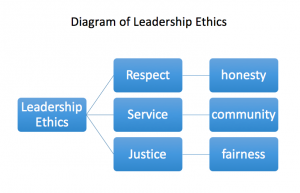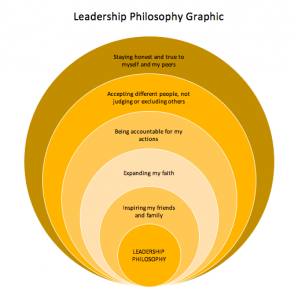It felt really good showing my peers my e-portfolio that I’ve been working hard on all semester. I’m very proud of myself and how I’ve grown and learned as a leader. My peers gave me positive feedback on my portfolio and I am happy they enjoyed it as much as I did. After looking at others blogs in class, I found it very cool how unique each one really was. Everyone had their own personal take on the assignment and added their own twist. After knowing how much work it really took to complete these portfolios or blogs, I think we all respected each others piece. I liked the project a lot because it was a combination of everything we learned throughout class, and it was fun to share what we got from the class.
Perspective of Leadership
After this semester in my leadership class my perspective on leadership did not completely change, but my understanding of the concept of leadership most definitely expanded and grew. Looking back at my first reflecting I realize how narrow, or small my definition of leadership really was. I had no idea how complex the word leadership really is with all the different theories, styles, techniques, practices, ethics, and meanings it actually consists of. I’m thankful for this class, although sometimes the readings were tedious, I actually learned a lot and know I will benefit from it in the future.
Originally, I thought leadership was just influence of one person on another, or many others. Although this is true, it is a very brief definition. This class has taught me much more meaning to leadership. By doing activities in class such as skits, debates, presentations, group work, tests, reflections, and interviews we were able to bond as a class and participate with one another. This class was different than any other I had taken before. My previous leadership classes in high school were all fun and consisted of a lot of planning and group work. This class might have been more of a work load, but I for sure learned a lot more about leadership. I enjoyed all of the activities we did throughout the semester.
Another thing I enjoyed from the class in the lectures we were required to attend and reflect on. I’m not going to lie, at first I wasn’t to excited to go to these lectures, but after each one I was glad I went. Each leader made me think about myself and who I want to be as a leader, or even as a follower in our society today. I enjoyed listening to each speaker give insight on their personal experiences and advice they gave to us young students. I hope one day I can share my own accomplishments to others and inspire them the same way these speakers did to myself.
I learned a lot this semester in this leadership class. Surprisingly, I learned a lot more about myself than about the concepts and styles of leadership. This class helped me realize who I am as a leader, and who I want to be as a leader. I was able to develop my own personal leadership philosophy that I will continue to follow, change, and praise as I continue to get older and learn here at Baylor. Developing my leadership philosophy was probably the most important part of this class for myself. I discovered my goals for myself to become a happier, and more accepting person and leader. After looking at the important traits a leader must obtain, and my personal goals as a leader, I was able to come up with my philosophy.
The things I learned through this class about my fellow classmates, leadership, and myself are things that I will value and never forget through my college career. I am happy I had the opportunity to take this class and I’m thankful for all I learned and relationships I’ve developed.
Identity and Power
The song “Imagine“ sung by John Lennon is a good representation of the ideal peaceful world. He encourages everyone to imagine a world at peace without the barriers of borders or divisions of religion and nationality, and to consider the possibility that the focus of humanity should be living a life unattached to material possessions. This idea relates to the worldly leaders and both the power and influence they have amongst all people.
Power is something that many leaders strive for or need in order to succeed as a leader, however this may cause bad relationships between a leader and their followers. Both good and bad influence is the key part of leadership. A leader is someone who influences others by using their actions or voice. There are all sorts of different types of leaders such as political leaders, team captains, class presidents, C.E.Os, and many more. Each of these leaders have different responsibilities and personal goals, but it’s their influence on others that actually makes them a leader. Leadership is a complicated subject in debt, but on broad terms a leader is someone or something that influences others. In order to have a large influence on a large amount of people, a leader needs power and is sometimes willing to do whatever it takes to receive it.
Although most of the time we think about leadership in a positive way, there are situations where leaders influence others negatively. This can cause followers to make bad decisions or have no room to make decisions at all. Leaders use their empowerment over their followers by controlling all actions. This would cause an unhealthy relationship between the leader and their followers
Although a leader might need power to have some authority over their followers, it is important that they do not abuse it, meaning they have to use it justly and in a good way. The song image describes a world where we are all equal, no power over one another and where we come together through our differences and find peace with one another.
Leadership Development Timeline
Attached is my leadership reflection #2, development timeline TED Talk
Philosophy Video
Attached is a youtube link to my philosophy in video format.
Ethics
“Good leaders are honest. They do not lie, nor do they present the truth to others in ways that are destructive or counterproductive.”
After reading chapter 13 on ethics, I learned that they play an important role in leadership. The book defined the ethics of leadership as respect, service, justice, honesty, and community; and further explains the importance of each one. This quote specifically shows the importance of honesty. Being an honest leader no only helps gain followers that trust the leader, but it also helps a leader stay true to their values. It’s important for followers to trust their leader as well as the leader to trust in themselves. In my personal philosophy, I state that I will be honest and committed to staying true to myself and my peers.
Below is a diagram of important leadership ethics. In class I particularly learned a lot about this topic when we were sent in groups to interview random leaders on what they thought were important leadership ethics. This was one of my favorite activities we did this semester because it was an interactive way to look at other peoples perspectives of leadership.
Philosophy Graphic
This is a graphical representation of my personal leadership philosophy
Three Types Of Leadership
There are many different types of leadership that we’ve learned about this semester, but I decided to pick my three favorite to explain and reflect on. My three favorite types of leadership are servant leadership (226), team leadership (361), and transformational leadership (161).
Servant Leadership:
“Servant leaders attend fully to the needs of followers, are concerned with the less privileged, and aim to remove inequalities and social injustices. Because servant leaders shift authority to those who are being led, they exercise less institutional power and control.”
- Reading about servant leadership in chapter 10 was very interesting and inspiring. This chapter taught me a lot about this style of leadership. I learned that it emphasizes that leaders be attentive to the concerns of their followers, empathize with them, and nurture them. They put their followers first and develop strong relationships with them. Servant leaders want to serve, which is on thing that I admire about them. I also admire their selflessness and hard work to benefit others. I personally have had servant leadership roles through mission work. These positions have changed my life completely and helped me develop into a humble leader. I believe that servant leaders don’t always get the recognition they deserve because they volunteer or humbly act as leaders to benefit our society. In my leadership philosophy I state that I want to expand my faith and become a happier person. I believe I can do these things by upholding servant leadership positions through volunteer and mission work at my church.
Team Leadership:
“The team leadership model provides a framework in which to study the systematic factors that contribute to a team’s outcomes or general effectiveness. Within this approach, the critical function of leadership is to help the team accomplish its goals by monitoring and diagnosing the team and taking the requisite action.”
- I found this specific leadership approach very interesting because I didn’t realize the importance a team leader has. The particular focus of this approach is on real-life organizational teams and their effectiveness. It emphasizes the function of leadership that can be shared and distributed within the specific work team or group. These groups can vary in size but in particular I would picture this style of leadership used in businesses or classrooms. I’ve had experience with team leadership in my Leadership class in high school. The fifty kids in the class room were split into committees with around 8 people in each. These committees had their own responsibilities to benefit and represent the high school. Each person in the class held a leadership position and it was our job as a team to work together as leaders to get things done. Teamwork, and leadership were two very important things that we learned and practiced in the classroom.
Transformational Leadership:
“Transformational leaders are recognized as change agents who are good role models, who can create and articulate a clear vision for an organization, who empower followers to meet higher standards, who act in ways that make others want to trust them, and who give meaning to organizational life”
- I found transformational leadership interesting because of the ability the leader has to inspire their followers to accomplish amazing things. These leaders are motivational and persuasive. Throughout this chapter, there were seven areas of transformational leadership that consisted of idealized influence (charisma), inspirational motivation, intellectual stimulation, individualized consideration, contingent reward, management-by-exception, and laissez-faire. If a leader is strong in these aspects, than they are a strong transformational leader. One specific transformational leader that comes to my mind when studying this type of leadership is Martin Luther King Jr. MLK wanted change and was able to motivate others with his dedication and charismatic personality.
These are only three of many topics about leadership, and types of leadership that we cover this semester. Each topic was interesting to discuss and study. Before I took this class I absolutely had no idea how complex leadership really is.
How I Developed my Leadership Philosophy
I developed my personal leadership philosophy by looking at the important aspects in my life, the important principals of leadership, and my important goals as a leader. The important aspects in my life consist of my friends, my family, my dog, my school, and my church. These are just five of many aspects in my life that I value, and have developed me into both the person, and leader I am today. Without these people and communities, I would be completely different, which is why I included them in my personal philosophy. Along with those aspects, my philosophy was also influenced by the important principals of leadership. These principals include accountability, honesty, commitment, acceptance, confidence, and determination. In my opinion these are the six most important principals of leadership, because without them there is no way a leader will succeed. That is why I decided to include them in my personal philosophy. Lastly before I created my philosophy I brainstormed my goals as a leader, which are: to do my best at everything I try, to stay true to myself and my values, to let my faith continue to grow, to not judge others, and to be happy and proud of myself and my actions. These goals helped me develop my philosophy because they describe who I want to be, and what I want to do as a leader.
By brainstorming and looking at the important aspects in my life, the important principals of leadership, and my important goals as a leader, I was able to develop my personal leadership philosophy. I believe that these philosophy constantly change with age and growth within each person, but these are the main things I need to focus on in my life to become the leader I strive to be.
Leadership to me means…
There are countless amounts of different definitions of leadership but to me it means influencing others. I believe both good and bad influence is the key part of leadership. A leader is someone who influences others by using their actions or voice. There are all sorts of different types of leaders such as political leaders, team captains, class presidents, C.E.Os, and many more. Each of these leaders have different responsibilities and personal goals, but it’s their influence on others that actually makes them a leader. Leadership is a complicated subject in debt, but on broad terms a leader is someone or something that influences others. I’m looking forward in learning more about the different types of leaders and different traits a leader portrays. I’m hoping to expand my knowledge about leadership so I can become a better leader myself.


